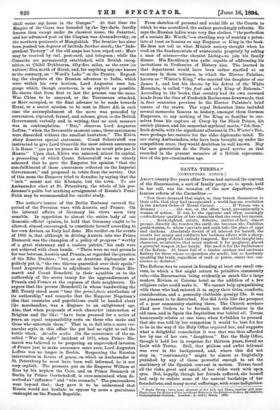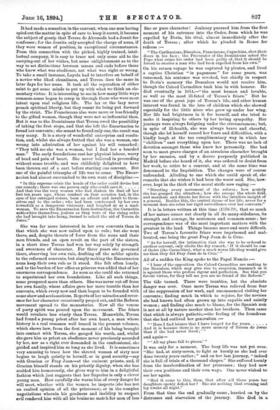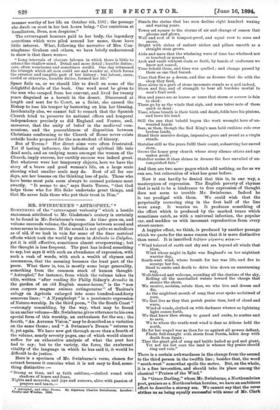SANTA TERESA.*
[CONCLUDING NOTICE.]
ABOUT twenty-five years after Teresa had entered the convent of the Encarnacion, a sort of family party, so to speak, held in her cell, was the occasion of the new departure,—the
famous reform of the Carmelites :—
"Few there dreamed that night, as they betook themselves to their cells, that they had inaugurated a world-famous resolution
in the Ancient Order of Mount Carmel If Teresa was a dreamer she was, on the other hand, pre-eminently a woman of action. It was to the opposite and often seemingly contradictory qualities of her character that she owed her success.
Keen-sighted, astute, didactic, matter-of-fact, almost prosaic, directly she touches the earth she becomes the Castilian gentlewoman, to whom convents and souls take the place of eggs and chickens. Absolutely devoid of all interest for herself, she counts her money and conducts her business affairs with a sharp- ness and grasp of detail entirely temporal. Her subtle insight into character, so intuitive that many mistook it for prophecy, placed a powerful weapon in her hands. She used it for the furtherance of the Reform. At times fall of a tender cajolery and unctuous flattery for those whose co-operation she needs; but as fearlessly speaking the truth, regardless of rank or power, where her con- science so dictated."
The Reform was to consist in founding at least one small con- vent, in which a few might return to primitive community
rule,—the Encarnacion being evidently as much like a large modern Riviera or Cairene hotel as the addition of a few religions rules could make it. We cannot help sympathising with those who had entered it to enjoy their titles, comforts, consideration, and a generally clubbable gossipy life. It was not, pleasant to be disturbed. Nor did Avila like the prospect of a poor .community starting there. The Church nowhere liked new Orders to be formed, nor disturbances in the old ones, and in Spain the Inquisition was behind all. Teresa humorously relates at one time, when forbidden to proceed that she was told by her companion it would be best for her to be in the way if the Holy Office required her, and suggests what a delightful consolation it was that was thus afforded her by one of her own "daughters." But the Holy. Office, though it held her in suspense for thirteen years, found no fault with Teresa. Still, that pitiless and awful tribunal
was ever in the background, and, where this did not step in, " contumacity " might be almost as frightfully
punished by any of those powerful enough to set the machinery of the Spanish convent in motion. Teresa faced all the risks, great and small, of her wider work with open eyes. But, happily, though her friends suffered, she herself had only to endure some of the natural hardships of her foundations, and many moral sufferings, with some indignities.
* Santa Teresa: being IMMO Aceount of her Life and Times, together with eame Pages from the Sistory of the last Great Refer min the Religions Orders: By Gabriela Ounninghame Graham. London : A. and 0. Black. 1891.
It had made a sensation in the convent, when one nun having spied out the matter in spite of care to keep it secret, it became the subject of gossip that Teresa de Ahumada had a Jesuit for confessor; for the Jesuits only accepted the charge of nuns, if they were women of position, in exceptional circumstances.
From this connection with the picked, highly trained, intel- lectual company, it is easy to trace not only some aid to the carrying-out of her wishes, but some enlightenment as to the way to set distinctions between means and ends before those who knew what was obedience, not what was right or wrong. To take a small instance, Loyola had to interfere on behalf of a novice who liked cleanliness, and Teresa does the same in later days for her nuns. It took all the reputation of either saint to get some minds to put up with what we think an ele- mentary virtue. It is interesting to see in how many little ways common-sense began to creep in through those who were most intent upon real religions life. The lax or the lazy never preach spiritual liberty, but they resent its being put forward by the strict. The Franciscans also were more or less friendly to the gifted woman, though they were not so influential then. But it was to the Dominicans that Teresa owed the possibility of taking the first steps, and that she left the Encarnacion to found her convents ; she meant to found only one, the result was very many. It is a story of wonderful enterprise and resolu- tion, and, whilst she always fretted that she was a woman, one wrung into admiration of her against his will remarked : "They told me she was a woman, but I find her a bearded man." The early foundations cost her physical labour, worry of head and pain of heart. She never believed in proceeding without some trouble, and was childishly delighted to have been thrown out of a cart before starting one convent. But one of the painful triumphs of life was to come. The Encar- nacion had almost succumbed to its own want of discipline :—
" In this supreme crisis the heads of the order could devise but
one remedy; there was one person only who could save it And that was the very woman who had shaken its dust off her feet ten years ago, whose conduct on that occasion bad, in the eyes of her outraged sisters, been an affront and insult to them- selves and to the order ; who had been condemned by her own townsfolk as a dangerous visionary, and laughed at as a mad- woman. To save the Encarnacion from destruction, the Carmelite authorities themselves, jealous as they were of the rising order she had brought into being, turned to solicit the aid of Teresa de Jesus."
She was far more interested in her own convents than in that which she was now called upon to rule ; but she went there, and, despite threats of force from the nuns and their
men Mends, and an open revolt on the part of the sisters, in a short time Teresa had won her way solely by strength and sweetness of character. For three years she governed there, observing her own rule, drafting off the nobler spirits to the reformed convents, but simply making the Encarnacion nuns keep their own rule as it stood. She felt often lonely, and to the burden of her office as prioress was added that of her enormous correspondence. As soon as she could she returned to superintend her own foundations. Like all such things,
some prospered more than others. She was never cut off from her own family, whose affairs gave her more trouble than her convents, which every now and then began to be founded with some show and acclamations. Reports of her miracles and rever- ence for her character occasionally peeped out., and the Reform movement spread to the monasteries. Now all the venom of party spirit was poured upon the movement. The friars would retaliate less wisely than Teresa. Meanwhile, Teresa had found a young priest after her own heart, a man whose history is a real romance well traced in the present volumes, which shows how, from the first moment of his being brought into contact with Teresa, she gauged his worth, and, whilst she gave him as priest an obedience never previously accorded by her, nor as a right ever demanded in the confessional, she guided and inspired him so long as she lived. It is sometimes very amusing to trace how the shrewd woman of sixty now begins to laugh quietly to herself, or in good security—say
with Gracian or Fray Juan—at the eminent priests, and, if Grecian himself stands on his priestly dignity, when she has scolded him humorously, she gives way to him in a delightful fashion which just suggests that her Superior is only a clever, young man. Jlow carefully she warns him of every danger he will meet, whether with the women he inspects (she has not an exalted opinion of all the prioresses), or in the complex
negotiations wherein his goodness and inability to suspect evil rendered him with all his brains no match for men of less fine or pure character! Jealousy pursued him from the first moment of his entrance into the Order, from which he was expelled by Doria, his rival, almost immediately after the death of Teresa ; after which he pleaded in Rome for redress :— "The Carthusians, Discalces, Franciscans, Capuchins, shut their doors in his face ; the Procurator of the Dominicans asked the Pope what crime his order had been guilty of, that it should be forced to receive a man who had been expelled from his own."
On his return voyage he was captured by pirates, and lived a captive Christian "in paganesse " for some years, was ransomed, his sentence was revoked, but chiefly in respect to Doria's memory the Descalzos would not receive him, though the Caked Carmelites took him in with honour. He
died eventually in 1614,—" the most human and lovable, as well as the most ill-fated of Teresa's friars." But he was one of the great joys of Teresa's life, and other human interest was found in the love of children which she showed especially for the little niece who grew up under her wing. Her life had brightness in it for herself, and she tried to make it inspiring to others by her loving sympathy. Her journeys were always fatiguing under the circumstances; but, in spite of ill-health, she was always brave and cheerful, though she let herself record her fears and difficulties, with a kindly laugh at the too complimentary way in which her " children " cast everything upon her. There was no lack of devotion amongst those who knew her personally. She had soon to meet grave charges of an atrocious character brought by her enemies, and by a decree purposely published in Madrid before she heard of it, she was ordered to desist from her work, to retire to a convent, and at the same time was denounced to the Inquisition. The charges were of course unfounded. Alluding to one which she could speak of, she remarks that she wishes it had been the worst said. She, how- ever, kept in the thick of the moral strife now raging :—
" Directing every movement of the reform ; how acutely she has grasped the situation ; how she sweeps the whole field, and marshals and directs her forces with the intuitive insight of a general. Besides this, the central theme of her life, never for a- moment does she relax her rigid surveillance over her convents."
It is in letters written at this time (1576-79), that so much of her nature comes out clearly in all its many-sidedness, its strength and courage, its acuteness and common-sense; her
correspondence was of the most important matters with the greatest in the land. Things became more and more difficult. Two of Teresa's favourite friars were imprisoned and mal- treated, one being the great Fray Juan de Is Cruz.
"As for herself, the intimation that she was to be ordered to another convent, only elicits the dry remark, If it should be one of theirs (the Carmelites), what a much worse life they would give me than they did Fray Juan de Is Cruz."
All of a sudden the King spoke to the Papal Nuncio :— "I hear of the opposition the Calced Carmelites are making to. the Descalzos, which may give rise to suspicion, inasmuch as it is against those who profess rigour and perfection. See that you favour virtue, for they tell me you are no friend of the Reform."
The tide turned. There were troubles, but the absolute danger was over. Once more Teresa was relieved from fear of the suppression of her work, and recommenced visiting her convents; finding much in which to rejoice, for the novices she had known had often grown up into capable and saintly women ; and finding also much to blame, for the Spanish nun is not at all by nature meeker than her brothers. Then came that which is always pathetic,—the feeling of the foundress that she had outlived her generation :—
"Here I find leisure that I have longed for for years
And it is because there is no more memory of Teresa de Jesus than if she had never lived ; ' "
and again—
"'An my plans fall to pieces.'" It was only for a moment. The busy life was not yet over. "She had, at sixty-seven, to fight as keenly as she had ever done twenty years earlier ; " and on her last journey, "indeed she is fall of trials of a thousand shapes." She suffered keenly from the insubordination of her prioresses ; they had now their own positions and their own ways. One never wished to see her again.
"Had it come to this, then, that after all these years her daughters openly defied her ? She ate nothing that evening and lay awake all night."
From that time the end gradually came, hurried on by the distresses and starvation of the journey. She died in a
manner worthy of her life on October 4th, 1582; the passage she dwelt on most in her last hours being, " Cor contritum et humiliatum, Dens, non despicies."
The extravagant honours paid to her body, the legendary accretions which were piled around her name, those have little interest. What, following the narrative of Mrs. Cun- ninghame Graham and others, we have briefly endeavoured to show is that there were— "Long intervals of obscure labours in which there is little to attract the shallow mind. Detail and more detail ; humble duties ; care, often wearisome and sometimes sordid. One day witnessed the triumph which all men could see and wonder at, which forms the exterior and tangible part of her history ; but labour, cares, sordid or otherwise, humble duties, formed her life."
Space fails us, or we should 11kb to dwell on some of the delightful details of the book. One word must be given to the nun who escaped from her convent, and lived for twenty years disguised as a hermit in the desert. Discovered at length and sent for to Court, as a Saint, she caused the Bishop to lose his temper by bestowing on him her blessing. Incidentally also, we cannot fail to remark that the Spanish Church tried to preserve its national offices and temporal independence precisely as did England and France, and, moreover, that the unity of belief in the medimval com- munions, and the peaceableness of disposition between Christians conforming to the Church of Rome never exists outside books prepared for the non-student of history.
But of Teresa ? Her direct aims were often frustrated. Yet if lasting influence, the infusion of spiritual life into -dead souls, and an undying name amongst the women of the Church, imply success, her earthly success was indeed great. But whatever were her temporary objects, here we have the story of a brave and good woman's life, on a large scale showing what smaller souls may do. Best of all for our clays, are her lessons on the thinking less of pain. Those who have borne most pain seem always to counsel patience most sweetly. "It seems to me," says Santa Teresa, "that God helps those who for His Sake undertake great things, and that He never fails those who put their trust in Him."




































 Previous page
Previous page